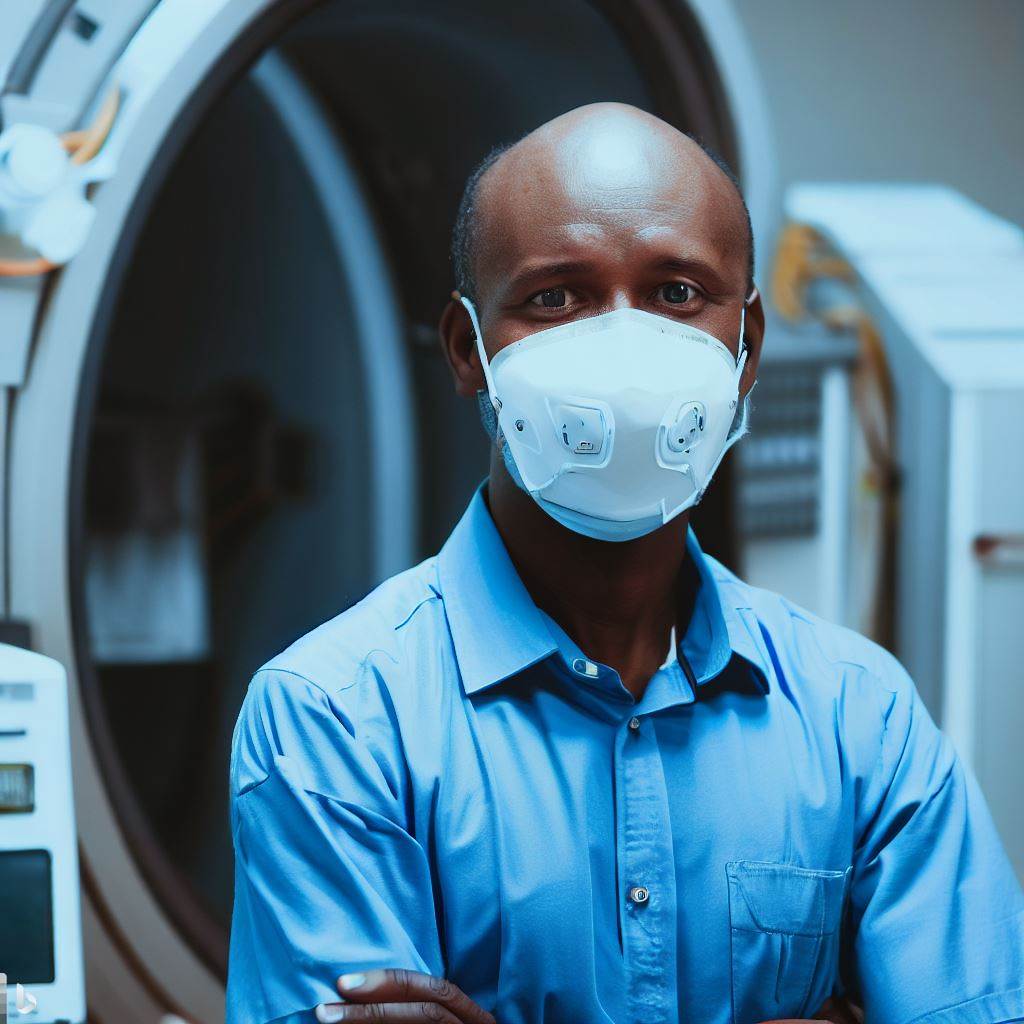Introduction
In Nigeria, the field of speech-language pathology holds immense importance as it tackles communication and swallowing disorders.
As a speech-language pathologist in this country, you have the unique opportunity to make a significant impact on the quality of life for individuals facing such challenges.
This profession offers a rewarding path towards helping people regain their ability to communicate effectively and overcome swallowing difficulties.
By providing specialized care and support, you can contribute to enhancing the lives of those in need.
Nigeria’s diverse and vibrant communities offer a dynamic environment for speech-language pathologists to flourish.
The growing awareness of speech disorders and the increasing demand for rehabilitation services create a favorable landscape for professional development and career growth.
In this blog post, we will explore essential insights and strategies that will empower you to excel as a speech-language pathologist in Nigeria.
Discover the key factors, resources, and opportunities that will allow you to thrive in this fulfilling and vital role.
Let’s embark on this journey of making a positive difference in the lives of countless individuals across Nigeria.
Overview of Speech-Language Pathology in Nigeria
Definition and Scope of Speech-Language Pathology
Speech-Language Pathology, also known as SLP or speech therapy, is a specialized field in healthcare that focuses on diagnosing and treating communication disorders and swallowing difficulties.
The scope of speech-language pathology in Nigeria encompasses a wide range of communication disorders, including speech sound disorders, language disorders, fluency disorders, voice disorders, and swallowing disorders.
Speech-language pathologists work with individuals of all ages, from infants to the elderly, addressing their unique needs and challenges.
Current State of Speech-Language Pathology in Nigeria
Currently, speech-language pathology in Nigeria is evolving but still faces numerous obstacles.
One major challenge is the limited awareness among the general population about the importance of early intervention and the availability of speech therapy services.
Many individuals, particularly those in rural areas, lack access to trained professionals and appropriate facilities.
Moreover, there is a scarcity of qualified speech-language pathologists in Nigeria due to the profession being relatively new in the country.
This shortage leads to long waiting lists and delays in providing essential services to those in need.
The infrastructure and resources for speech therapy services are also insufficient.
The lack of specialized equipment, assessment tools, and therapy materials hinders the optimal implementation of treatment plans.
Furthermore, limited funding and support from the government add to the difficulties faced by speech-language pathologists, who often rely heavily on personal resources and improvised techniques.
Challenges Faced by Speech-Language Pathologists in Nigeria
- Language Diversity: Nigeria’s linguistic diversity, with over 500 native languages, poses a significant hurdle for speech-language pathologists.
Dealing with multilingualism requires extensive knowledge and expertise in different languages and dialects. - Societal Stigma: There are misconceptions surrounding communication disorders in Nigerian society. Many people consider speech and language difficulties as signs of intellectual disabilities or spiritual afflictions.
Due to these beliefs, individuals with communication disorders often face discrimination and social isolation, making it harder for them to seek treatment. - Lack of Standardized Assessment Protocols: The absence of standardized tests specific to the Nigerian population makes it challenging to accurately diagnose communication disorders.
This hampers the effectiveness of evaluation and monitoring progress in therapy.
To thrive as a speech-language pathologist in Nigeria, awareness campaigns should be conducted to educate the public about the importance of early intervention and the availability of speech therapy services.
Addressing the scarcity of qualified professionals requires investing in education and training programs to produce more skilled speech-language pathologists.
Improving infrastructure and securing funding for specialized equipment and materials will enhance the quality of therapy services.
Collaborating with local communities and involving families in the therapy process can also help reduce societal stigma and encourage individuals with communication disorders to seek treatment.
Furthermore, developing standardized assessment protocols and norms tailored to the Nigerian population will aid in accurate diagnosis and effective therapy planning.
Embracing technological advancements in teletherapy can also improve access to services for those in remote areas.
In short, while speech-language pathology in Nigeria plays a crucial role in helping individuals overcome communication disorders and swallowing difficulties, addressing the challenges is vital to ensure comprehensive care for those in need.
Essential Skills for Thriving as a Speech-Language Pathologist
As a speech-language pathologist in Nigeria, there are several essential skills that are crucial for thriving in this profession.
These skills will not only enable you to effectively manage diverse communication disorders but also ensure your continuous professional development and success.
Additionally, possessing cultural sensitivity and adaptability is vital to connect with and understand your clients better.
Strong Communication and Interpersonal Skills
One of the most fundamental skills for a speech-language pathologist is having strong communication and interpersonal abilities.
Being able to effectively communicate with your clients, their families, and other professionals is essential in providing them with the support they need.
Active listening, empathy, and clear articulation are some key elements of strong communication skills.
Furthermore, good interpersonal skills will allow you to build trust and establish a positive therapeutic relationship with your clients.
This includes being patient, understanding, and respectful towards their needs and concerns.
Knowledge of Diverse Communication Disorders and Their Management
To be successful as a speech-language pathologist in Nigeria, it is crucial to have an in-depth knowledge of diverse communication disorders and their corresponding management strategies.
This includes disorders such as stuttering, aphasia, speech sound disorders, and developmental delays.
Staying up-to-date with the latest research and industry standards is imperative to provide evidence-based interventions and therapies.
You must constantly educate yourself about new assessment tools, treatment approaches, and technological advancements in the field.
Continuous Professional Development and Learning
In any healthcare profession, continuous professional development is essential for growth and success. For speech-language pathologists, it is crucial to actively seek opportunities for learning and development.
This can be achieved through attending conferences, workshops, webinars, and participating in relevant training programs.
Engaging in professional organizations and networks also allows you to stay connected with fellow professionals and gain valuable insights into the field.
Taking the initiative to advance your knowledge and skills will not only benefit your clients but also enhance your professional reputation.
Cultural Sensitivity and Adaptability
Nigeria is a country rich in cultural diversity, and as a speech-language pathologist, you must be culturally sensitive and adaptable.
Different cultures have unique communication styles, beliefs, and perceptions, which may impact how individuals and their families approach therapy.
Understanding and respecting cultural differences is crucial in building trust and effectively tailoring interventions to meet the needs of your clients.
Being adaptable and flexible in your approach will enable you to effectively navigate various cultural contexts and deliver client-centered care.
In essence, thriving as a speech-language pathologist in Nigeria requires a combination of strong communication and interpersonal skills, knowledge of diverse communication disorders and their management, continuous professional development, and cultural sensitivity.
By honing these essential skills, you can make a significant difference in the lives of individuals with communication disorders and achieve professional success.
Read: The Path to Becoming a Surgeon in Nigeria
Establishing Professional Relationships in Nigeria
Building rapport with patients and their families is crucial for speech-language pathologists to thrive in Nigeria.
By establishing trust and understanding, SLPs can effectively support their patients in their speech and language development.
Collaborating with other healthcare professionals is essential in providing holistic care to patients.
By working together, SLPs can integrate their expertise with other medical professionals to develop comprehensive treatment plans.
Networking with speech-language pathologists in Nigeria is also important for professional growth and development.
Building connections with colleagues allows SLPs to exchange knowledge, share experiences, and stay updated on the latest practices in the field.
Building Rapport with Patients and their Families
- Actively listen to patients and their families to understand their concerns and needs.
- Show empathy and create a safe, non-judgmental environment for open communication.
- Tailor treatment plans according to cultural backgrounds and individual preferences.
- Provide education and guidance to families regarding speech and language goals.
- Regularly assess progress and involve patients and families in setting achievable targets.
Collaborating with Other Healthcare Professionals
- Attend interdisciplinary meetings to discuss patient cases and share expertise.
- Communicate effectively with doctors, nurses, psychologists, and other medical professionals.
- Seek input from colleagues to gain different perspectives on patient care.
- Collaborate in multidisciplinary teams to develop impactful treatment plans.
- Continuously participate in professional development activities to enhance collaboration skills.
Networking with Speech-Language Pathologists in Nigeria
- Join professional organizations such as the Nigerian Speech-Language and Hearing Association (NSLHA).
- Attend conferences, seminars, and workshops to meet and connect with fellow SLPs.
- Engage in online forums and discussion groups to share insights and seek advice.
- Participate in mentorship programs to learn from experienced SLPs in Nigeria.
- Be an active member of the local SLP community, contributing to its growth and development.
By actively establishing professional relationships, speech-language pathologists can thrive in Nigeria while delivering high-quality care, fostering collaboration, and staying connected with the SLP community.
Read: Key Skills Required for an MRI Technologist in Nigeria
Navigating Education and Licensing Requirements
As a speech-language pathologist (SLP) in Nigeria, it is essential to have a strong educational background and fulfill all licensing requirements.
Here are the key steps to thrive in this profession:
Obtaining a relevant degree in speech-language pathology
- Choose a reputable university that offers a Bachelor’s or Master’s degree in speech-language pathology.
- Ensure the program is accredited by the appropriate Nigerian regulatory bodies.
- Complete all coursework and clinical practicum requirements to gain a solid foundation in the field.
- Stay updated with the latest research and advancements in speech-language pathology.
Fulfilling licensing and certification requirements
- Research the specific licensing requirements of the state or region where you intend to practice.
- Prepare all necessary documentation, including academic transcripts, clinical experience records, and references.
- Submit the application for licensing to the appropriate regulatory body along with the required fees.
- Prepare for any interviews or examinations that may be part of the licensing process.
- Once licensed, remember to renew your license regularly and comply with any continuing education requirements.
Continuing education opportunities in Nigeria
- Take advantage of professional development opportunities offered by local professional organizations.
- Attend conferences, workshops, and seminars to expand your knowledge and network with other SLPs.
- Engage in online courses or webinars to enhance your skills and stay updated on current practices.
- Consider pursuing advanced certifications or specialized training in areas of interest within speech-language pathology.
By navigating the education and licensing requirements effectively, you can establish yourself as a skilled and respected speech-language pathologist in Nigeria.
This will not only enhance your professional reputation but also contribute to the overall growth of the field in the country.
Read: The Role of Optometrists in Nigerian Public Health

Addressing the Economic and Infrastructure Challenges
As a Speech-Language Pathologist (SLP) in Nigeria, there are certain economic and infrastructure challenges that need to be addressed in order to thrive and provide effective therapy services to clients.
Affordability of therapy services for clients
- Understand the economic realities: Recognize that many clients may not be able to afford expensive therapy sessions.
- Provide sliding scale fees: Offer flexible pricing options based on the client’s income to make therapy more accessible.
- Collaborate with insurance companies: Advocate for the inclusion of speech therapy in insurance coverage to reduce financial burden on clients.
- Seek funding opportunities: Explore grants and funding options to subsidize therapy costs for clients with limited resources.
Limited availability of resources and equipment
- Adapt and improvise: Be creative in utilizing available resources and adapt therapy techniques to suit the local context.
- Share resources: Collaborate with other SLPs to pool resources and improve access to necessary equipment.
- Seek donations and sponsorships: Reach out to organizations and businesses for donations or sponsorships to acquire essential resources.
- Embrace technology: Utilize online resources, virtual platforms, and telepractice to access therapy materials and connect with experts globally.
Finding innovative solutions within the local context
- Engage with local communities: Understand the specific needs of the community and co-create solutions with them.
- Train local professionals: Build capacity by providing training and education to local healthcare professionals and community members.
- Advocate for policy changes: Raise awareness about the importance of speech therapy and advocate for policies that support its development.
- Foster partnerships: Collaborate with local organizations and institutions to leverage their expertise and resources to address challenges.
In general, as a Speech-Language Pathologist in Nigeria, it is crucial to address the economic and infrastructure challenges to thrive in the profession and provide quality therapy services to clients.
By adopting innovative strategies, collaborating with stakeholders, and advocating for change, SLPs can make a significant impact on communication health in Nigeria.
Read: Occupational Therapy Schools: Where to Study in Nigeria
Creating Awareness and Advocacy
Educating the Public about Speech-Language Pathology
To thrive as a speech-language pathologist in Nigeria and positively impact individuals with communication disorders, creating awareness and advocacy is vital.
The first step is to educate the public about speech-language pathology.
This can be achieved through community outreach programs, school visits, and public awareness campaigns.
By informing parents, teachers, and the general public about speech and language disorders, the significance of early intervention, and the role of speech-language pathologists, a greater understanding and acceptance of the profession can be fostered.
Advocating for Improved Resources and Services
Advocacy plays a crucial role in enhancing resources and services for speech-language pathologists.
Professionals in the field should actively advocate for policies that ensure access to quality services, appropriate funding, and insurance coverage for individuals with communication disorders.
By engaging in lobbying efforts with government officials and participating in advocacy groups, speech-language pathologists can influence policies that support their practice and ultimately improve the well-being of their clients.
Collaborating with Relevant Organizations and Government Bodies
Collaboration is paramount for the advancement of speech-language pathology in Nigeria.
Speech-language pathologists should establish partnerships with educational institutions, healthcare facilities, and non-governmental organizations (NGOs) to develop comprehensive programs and interventions.
Interdisciplinary teamwork, access to research and training opportunities, as well as sharing resources and expertise, can be achieved through such collaboration.
Additionally, close ties with government bodies, specifically ministries of health and education, enable professionals to contribute to the development of policies and guidelines related to speech-language pathology services in the country, fostering a supportive environment and increasing the recognition of the profession.
Generally, thriving as a speech-language pathologist in Nigeria requires a strategic approach.
By educating the public about speech-language pathology, advocating for improved resources and services, and collaborating with relevant organizations and government bodies, professionals in this field can make a significant difference in the lives of individuals with communication disorders.
These efforts will ensure that clients receive the necessary support to reach their full communication potential.
Read: Future of Optometry in Nigeria: Trends and Predictions
Promoting Self-Care and Professional Well-being
In order to thrive as a Speech-Language Pathologist (SLP) in Nigeria, it is essential to prioritize self-care and cultivate a support system within the profession.
In this section, we will explore strategies for managing workload and stress, as well as ways to prioritize personal and professional growth.
Strategies for managing workload and stress
- Set realistic goals and expectations for yourself to avoid overwhelming workloads.
- Learn to delegate tasks when possible to lighten your workload and create more balance.
- Practice effective time management techniques, such as prioritizing tasks and breaking them into manageable chunks.
- Take breaks throughout the day to rest and recharge, avoiding burnout.
- Engage in stress-relieving activities outside of work, such as exercise, hobbies, or meditation.
Cultivating a support system within the profession
- Attend professional conferences and workshops to connect with fellow SLPs and build a network of support.
- Join professional organizations or online forums to engage in discussions and share experiences with colleagues.
- Participate in mentorship programs to learn from seasoned professionals and gain guidance in your career.
- Collaborate with other SLPs on research projects or case studies to foster a sense of camaraderie and support.
- Seek supervision or consultation from experienced SLPs when facing challenging cases or decisions.
Prioritizing personal and professional growth
- Engage in continuous professional development by attending workshops, seminars, and webinars.
- Stay updated with the latest research and advancements in the field of speech-language pathology.
- Set aside time for personal reflection and self-assessment to identify areas for growth and improvement.
- Seek out opportunities for specialization or advanced training in specific areas of interest.
- Invest in your own well-being by engaging in activities that bring you joy and fulfillment outside of work.
By implementing these strategies, SLPs in Nigeria can effectively manage their workload and stress, while also promoting personal and professional well-being.
Remember, taking care of yourself is crucial to providing quality care to your clients and maintaining a long and successful career as an SLP.
Read: Success Stories of Nigerian Speech-Language Pathologists
Success Stories and Inspirational Experiences
As a Speech-Language Pathologist (SLP) in Nigeria, I have had my fair share of successes and inspiring experiences in helping individuals with communication disorders.
These stories not only serve as personal achievements but also motivate and encourage aspiring SLPs who are looking to make a difference in the lives of others.
Read: The Role of Exercise Physiology in Nigeria’s Sports Industry
Sharing Personal Success Stories
- Witnessing a child’s first word after months of therapy is a moment that fills me with immense joy.
- Helping a stuttering teenager gain confidence and fluency, enabling them to participate actively in school and social activities.
- Assisting an adult with aphasia in regaining their ability to communicate effectively, restoring their independence and quality of life.
These success stories highlight the positive impact that SLPs can have on individuals of all ages and their families. It is through dedication, expertise, and compassion that these achievements are possible.
Highlighting Inspiring Journeys of Other Professionals in Nigeria
- Oluwatobi, a fellow SLP, started her career in a small clinic but now runs a successful private practice.
- Chinwe, an SLP in a rural area, has been instrumental in raising awareness about speech and language disorders.
- Emeka, a renowned SLP, has pioneered new treatment techniques and made significant contributions to the field.
These stories inspire us to overcome challenges, pursue excellence, and create a positive impact on the field of speech-language pathology in Nigeria.
Motivating and Encouraging Aspiring Speech-Language Pathologists
- To aspiring SLPs in Nigeria, I encourage you to stay focused on your goal of helping individuals communicate better.
- Remember that each success story starts with a passion for making a difference and a dedication to learning and growing.
- Be open to mentorship opportunities and continuous professional development to enhance your skills and knowledge.
- Network with other professionals, both locally and globally, to gain inspiration and support in your journey.
The road to becoming a successful SLP in Nigeria may have its challenges, but the rewards are immeasurable.
You have the opportunity to transform lives and create a positive impact on your community.
In fact, success stories and inspirational experiences give us the motivation and drive to thrive as speech-language pathologists in Nigeria.
By sharing personal achievements, highlighting the journeys of other professionals, and motivating aspiring SLPs, we pave the way for a brighter future in communication disorders management and treatment in our country.
Read: Step-by-step Guide to Becoming a Nursing Assistant in Nigeria
Conclusion
Recap of key points:
- Speech-Language Pathology is a growing field in Nigeria with various challenges.
- Nigerian SLPs must overcome limited resources, lack of awareness, and cultural beliefs.
- Continued professional development and networking are crucial for success.
Encouragement for speech-language pathologists in Nigeria:
- You have the power to make a difference in the lives of individuals with communication disorders.
- Your expertise and dedication can contribute to the growth and development of the profession.
- Keep pushing forward, even in the face of challenges, as your work is important and valued.
Final thoughts on thriving in the field:
- Remember the impact you have on your clients and the joy of witnessing their progress.
- Find support and build a community with other SLPs in Nigeria.
- Advocate for more resources, funding, and awareness for the field.
- Continue seeking opportunities for professional growth and stay updated on research and technology.
On a final note, although there are challenges, speech-language pathologists in Nigeria have the opportunity to thrive and make a significant impact on individuals with communication disorders.
By overcoming the obstacles, staying dedicated to their profession, and continuing to grow, SLPs in Nigeria can pave the way for a brighter future in the field.




